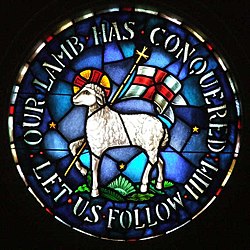Bohemian Brethren
| Unity of the Brethren | |
|---|---|
| Unitas Fratrum | |

Church emblem featuring the Agnus Dei.
Stained glass at the Rights Chapel of Trinity Moravian Church, Winston-Salem, North Carolina, United States |
|
| Classification | Protestant |
| Orientation | Hussite beliefs with Lutheran Pietist influences |
| Founder | followers of Jan Hus and Petr Chelčický |
| Origin | 1457 Bohemia |
| Congregations | 1000+ |
| Number of followers | 750,000 |
The Moravian Church, formally named the Unitas Fratrum (Latin for the "Unity of the Brethren"), in German known as Herrnhuter Brüdergemeine (meaning "Brethren's Congregation from Herrnhut", the place of the Church's renewal in the 18th century), is one of the oldest Protestant denominations in the world, with its heritage dating back to the Bohemian Reformation in the fifteenth century and the Unitas Fratrum (Jednota bratrská in Czech) established in Kingdom of Bohemia.
The name by which the Church is commonly known comes from the original exiles who fled to Saxony in 1722 from Moravia to escape religious persecution, but its heritage began in 1457 in Bohemia and its crown lands (Moravia and Silesia), then an autonomous kingdom within the Holy Roman Empire (today the Czech Republic). The modern Unitas Fratrum, with about 750,000 members worldwide, continues to draw on traditions established during the eighteenth century. The Moravians continue their long tradition of missionary work, for example in the Caribbean. This is reflected in their broad global distribution. The Church places a high value on ecumenism, personal piety, missions and music.
The Church’s emblem is the Lamb of God (Agnus Dei) with the flag of victory, surrounded by the Latin inscription: Vicit agnus noster, eum sequamur (English: "Our Lamb has conquered, let us follow Him").
...
Wikipedia
